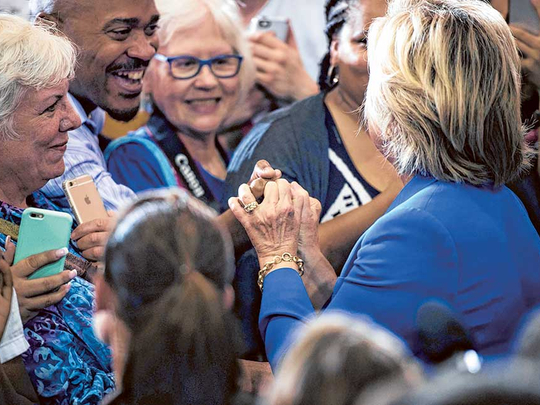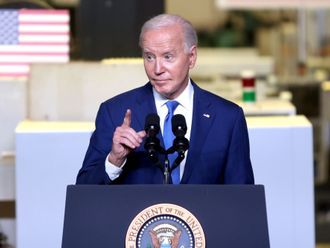
Washington: Republicans went on the attack Saturday after Hillary Clinton, during remarks at a fund-raiser late Friday night, said that “you could put half of [Donald] Trump’s supporters into what I call the basket of deplorables,” which she referred to as “racist, sexist, homophobic, xenophobic, Islamophobic — you name it.”
In tweets, speeches and press statements, Trump, his running mate Mike Pence, and Republican officials accused Clinton of elitism and disrespect. Pence, the Indiana governor, said Clinton had insulted “hardworking Americans.”
“Hillary, they are not a basket of anything. They are Americans, and they deserve your respect,” Pence said during a speech to the conservative Values Voter Summit in Washington, D.C.
The duelling statements increased the focus on racial and ethnic tension that already has dominated the 2016 campaign, often to Trump’s detriment. This time, however, it was Republicans who thought their opponent had wandered into political damaging territory.
Pence said Clinton’s “low opinion” of the American people disqualified her from being elected president. “The men and women who support Donald Trump’s campaign are hardworking Americans — farmers, coal miners, teachers, veterans, members of our law enforcement community — members of every class of this country, who know that we can make America great again,” he said.
The Republican criticism prompted a quick, but partial, apology from Clinton, who said in a statement released early Saturday: “Last night I was ‘grossly generalistic,’ and that’s never a good idea. I regret saying ‘half’ -- that was wrong.”
But Clinton went on to say that Trump had nevertheless repeatedly engaged in “deplorable” behaviour throughout his campaign. She cited his attacks on a federal judge’s Mexican heritage, his comments about the parents of a Muslim soldier killed in Iraq, and his role as a leader of the birthed movement that wrongly claimed President Obama was not born in the United States.
“I won’t stop calling out bigotry and racist rhetoric in this campaign,” Clinton said.
In a call with reporters organised by the Republican National Committee, Trump supporters said that Clinton had been caught saying in private something she would not have said in public.
Her comment was “reprehensible, despicable, yet revealing,” said Cleveland Pastor Darrell Scott. “She was basically caught. She wasn’t expecting this to get out,” he said. “It demonstrates the type of person she really is.”
In fact, however, Clinton’s aides had invited reporters to watch her remarks at the fund-raiser — something they often do not do (and Trump’s campaign almost never does) -- and she had previously used a version of the “deplorable” remark in an interview.
All that suggests the remark may not have been one the campaign was trying to hide.
Indeed, some Republican strategists suggested that a campaign discussion of whether some of Trump’s supporters are racist — and, if so, how many — might be advantageous to Clinton.
“This has to do with really trying to make swing voters uncomfortable with the idea of associating with the racist and anti-intellectual voters that make up the energy of the Trump base,” said GOP operative Rob Stutzman, who is supporting neither Clinton nor Trump.
He said that at first blush Clinton’s comment appears “mildly stupid,” but added: “I don’t think it’s damaging at all.”
“What’s most telling is her apology where she apologised for saying ‘half.’ When you get into swing-voter world, I think it makes sense for her to make swing voters uncomfortable with the racist and uneducated hue of the voters that are part of his base.”
Trump’s camp clearly hoped the remark would be this year’s version of the “47% of the people” line that clung to Republican nominee Mitt Romney in 2012.
In a recording from a private fund-raising event that year, Romney could be heard saying that 47% of Americans would automatically vote for President Obama because they were dependent on government.
But the impact such events can have on a presidential campaign is often overstated.
The 2012 campaign, for example, also featured a remark by Obama — that entrepreneurs who created a successful business “didn’t build that” on their own — which Republicans believed would help them.
Party strategists felt so strongly about that remark that they structured an entire day of their nominating convention around it. In the end, “you didn’t build that” had no noticeable impact on the outcome.
Even the 47% remark had less impact on the final vote than it appeared to have at the time, public opinion research has found.
Moreover, part of the sting of the 47% remark was that it disparaged people whose votes Romney was seeking — working-class Americans who might at one point have received government benefits and might resent being referred to as being dependent. Clinton, by contrast, hasn’t been actively trying to get votes from Americans who harbour strong racial animosities.
The comments in question came as Clinton introduced Barbra Streisand during Friday night’s fund-raiser with gay and lesbian supporters in New York. During her remarks, she talked about the year’s “volatile political environment” and said that to be “grossly generalistic,” Trump’s supporters could be put into two categories.
One, she said, was the “basket of deplorables.”
“Unfortunately there are people like that,” she said, “and he has lifted them up. He has given voice to their websites that used to only have 11,000 people — now have 11 million. He tweets and retweets their offensive, hateful, mean-spirited rhetoric.”
The other group, she said, “are people who feel that the government has let them down, the economy has let them down, nobody cares about them, nobody worries about what happens to their lives and their futures, and they’re just desperate for change.”
“They don’t buy everything he says, but he seems to hold out some hope that their lives will be different,” she added. “Those are people we have to understand and empathise with as well.”
— Los Angeles Times












